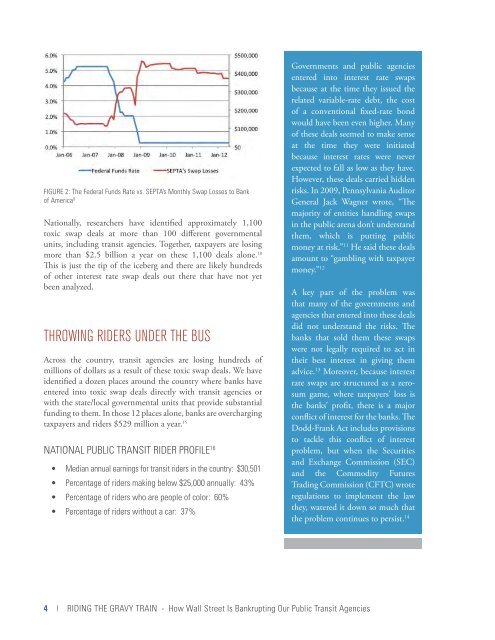Riding the Gravy Train - ReFund Transit
Riding the Gravy Train - ReFund Transit
Riding the Gravy Train - ReFund Transit
You also want an ePaper? Increase the reach of your titles
YUMPU automatically turns print PDFs into web optimized ePapers that Google loves.
FIGURE 2: The Federal Funds Rate vs. SEPTA’s Monthly Swap Losses to Bank<br />
of America 9<br />
Nationally, researchers have identified approximately 1,100<br />
toxic swap deals at more than 100 different governmental<br />
units, including transit agencies. Toge<strong>the</strong>r, taxpayers are losing<br />
more than $2.5 billion a year on <strong>the</strong>se 1,100 deals alone. 10<br />
This is just <strong>the</strong> tip of <strong>the</strong> iceberg and <strong>the</strong>re are likely hundreds<br />
of o<strong>the</strong>r interest rate swap deals out <strong>the</strong>re that have not yet<br />
been analyzed.<br />
THROWING RIDERS UNDER THE BUS<br />
Across <strong>the</strong> country, transit agencies are losing hundreds of<br />
millions of dollars as a result of <strong>the</strong>se toxic swap deals. We have<br />
identified a dozen places around <strong>the</strong> country where banks have<br />
entered into toxic swap deals directly with transit agencies or<br />
with <strong>the</strong> state/local governmental units that provide substantial<br />
funding to <strong>the</strong>m. In those 12 places alone, banks are overcharging<br />
taxpayers and riders $529 million a year. 15<br />
NATIONAL PUBLIC TRANSIT RIDER PROFILE 16<br />
• Median annual earnings for transit riders in <strong>the</strong> country: $30,501<br />
• Percentage of riders making below $25,000 annually: 43%<br />
• Percentage of riders who are people of color: 60%<br />
• Percentage of riders without a car: 37%<br />
Governments and public agencies<br />
entered into interest rate swaps<br />
because at <strong>the</strong> time <strong>the</strong>y issued <strong>the</strong><br />
related variable-rate debt, <strong>the</strong> cost<br />
of a conventional fixed-rate bond<br />
would have been even higher. Many<br />
of <strong>the</strong>se deals seemed to make sense<br />
at <strong>the</strong> time <strong>the</strong>y were initiated<br />
because interest rates were never<br />
expected to fall as low as <strong>the</strong>y have.<br />
However, <strong>the</strong>se deals carried hidden<br />
risks. In 2009, Pennsylvania Auditor<br />
General Jack Wagner wrote, “The<br />
majority of entities handling swaps<br />
in <strong>the</strong> public arena don’t understand<br />
<strong>the</strong>m, which is putting public<br />
money at risk.” 11 He said <strong>the</strong>se deals<br />
amount to “gambling with taxpayer<br />
money.” 12<br />
A key part of <strong>the</strong> problem was<br />
that many of <strong>the</strong> governments and<br />
agencies that entered into <strong>the</strong>se deals<br />
did not understand <strong>the</strong> risks. The<br />
banks that sold <strong>the</strong>m <strong>the</strong>se swaps<br />
were not legally required to act in<br />
<strong>the</strong>ir best interest in giving <strong>the</strong>m<br />
advice. 13 Moreover, because interest<br />
rate swaps are structured as a zerosum<br />
game, where taxpayers’ loss is<br />
<strong>the</strong> banks’ profit, <strong>the</strong>re is a major<br />
conflict of interest for <strong>the</strong> banks. The<br />
Dodd-Frank Act includes provisions<br />
to tackle this conflict of interest<br />
problem, but when <strong>the</strong> Securities<br />
and Exchange Commission (SEC)<br />
and <strong>the</strong> Commodity Futures<br />
Trading Commission (CFTC) wrote<br />
regulations to implement <strong>the</strong> law<br />
<strong>the</strong>y, watered it down so much that<br />
<strong>the</strong> problem continues to persist. 14<br />
4 | RIDING THE GRAVY TRAIN - How Wall Street Is Bankrupting Our Public <strong>Transit</strong> Agencies


